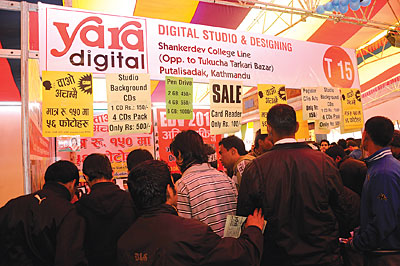 BIKRAM RAI |
As the politicians jostle for space in the new government, Nepalis are in the dark in more ways than one. Closing in on three years since the Constituent Assembly was tasked to lay out a template for Naya Nepal, we still don't know what is in store for us; the only certainty (and not always) is the loadshedding schedule and increments in the dark hours week on week. This year's CAN-InfoTech was instructive. Hordes of young Nepalis swarmed the stalls, and nowhere were they more numerous than where pen drives and solar-inverter hybrids were being hawked. The twin desires of the modern Nepali are symbols for each other: information and light.
Alas, neither seems to be forthcoming from the state. A plethora of agreements sprinkled liberally with buzzwords fails to illuminate the path forward or the mental states of our Machiavellian leaders. Every event is hailed as a milestone, then inevitably falls prey to a hail of criticism, misinterpretation, and confusion, so much so that it is hard to tell if we are moving forward or not.
Meanwhile, as our comprehensive survey on the state of play of the energy sector in Nepal indicates, we are on track for far worse loadshedding in the years to come. If you thought last year's 18 hours a day was bad, how about 22 hours a day? This is not fear-mongering, it is the likely future, all thanks to the myopia of this generation of politicians across the spectrum. Habituation can be a useful mental state when faced with such political and infrastructural challenges as Nepal offers. But it can also allow some to get away with murder. You may sigh, push away the day's headlines, and light a candle, but we run the risk of being the frog in a pot of water that doesn't know it's slowly being boiled to death.
What we need from our leaders is information for light, light for life. Tell us what you really want to do with the state of Nepal, and if you cannot come to an agreement, then let the people decide on the more crucially fraught points. Don't obfuscate, dissemble, vacillate. But while the finer points of politics are being discussed, remember that your people can't dine on modalities and consensuses. We reluctantly accept that you prioritise politics over the economy, but how about some multi-tasking?
READ ALSO:
Same-same, PRASHANT JHA
Straddling two boats, BIRAJ BAHADUR BISTA
The India factor, PRANAB DHAL SAMANTA


